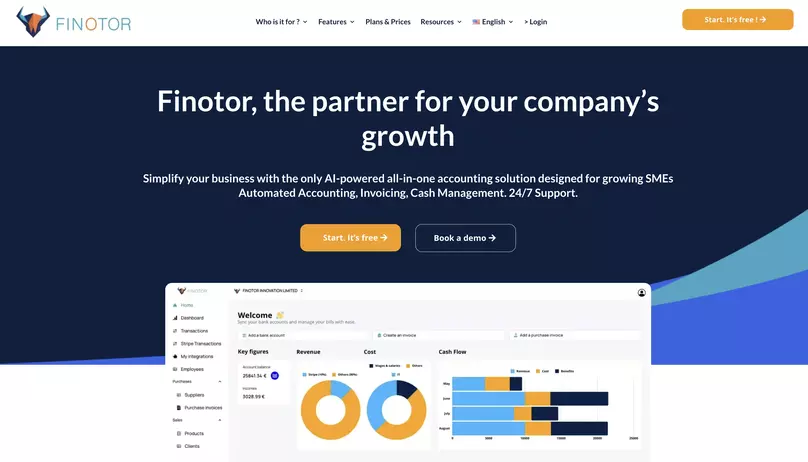Contents
- 1 Step 1: Deciding to sell your business
- 2 Step 2: Time your sale properly
- 3 Step 3: Organize and prepare your financial statements
- 4 Step 4: Identify and Value Business Assets
- 5 Step 5: Valuate your business
- 6 Step 6: Choose a Sales Method
- 7 Step 7: Consider using a broker
- 8 Step 8: Find a buyer
- 9 Step 9: Negotiate the Sale
- 10 Step 10: Navigating the final stages of the sale
- 11 Step 11: Post-Sale Considerations
- 12 Step 12: Plan for Life After the Sale
- 13 The article in brief :
- 14 Selling a business FAQs
- 15 The bottom line on selling your business
Wondering how to sell your business so you can make the most of your labor of love? First off, congratulations!
Selling the business that you worked so hard to create and build is a big choice, and one that comes with planning, goal setting, searching (for buyers, and maybe even some soul-searching, too), business valuation, and a whole lot more.
So before you start advertising your business in the local classifieds, start here: how to sell your business—the right way. To help guide you, we’ve made a list of six simple steps that you can follow all the way to the bank. 🏦
Ready to move from for sale to sold your business? Well, getting there will take longer than reading a few bullet points, but you’ve got to start somewhere! Let’s begin.
Step 1: Deciding to sell your business
Deciding to sell your business isn’t always an easy choice to make. It’s typically not a quick one, either. When you’ve reached this point, it usually means you’re in the midst of change, and that’s totally okay. This decision can be particularly challenging for small businesses, which often face unique hurdles during the selling process.
Here are just a few reasons why people make the decision to put the proverbial “for sale” sign on their business:
- A career or a life change. For example, a divorce, a death in the family, illness, or, in terms of your professional life, you’ve decided that you’re ready for your next move and a total career change. This could be anything making the switch from running a boutique graphic design agency to opening a bakery or moving from owning a catering company to becoming a full-time accountant. You do you—and sell your business to help you get there.
- Retirement. You’ve put in your time and have decided to call it quits and join the flock of snowbirds who travel south six months of the year. We wouldn’t blame you. ✈️
- Differences: Perhaps after five years in business together, you and your partner have decided that you want different things, and selling the business is the best way to achieve your respective goals. Don’t stress, this happens. And when it does, it’s best to have the agreements made up in advance of the sale.
- It’s just not working for you: You feel overworked, underpaid, or simply bored. When this happens, you’ve got a call to make: should you stay or sell?
Whatever the case, it’s important to know the reason behind your decision. Not only will it help you sleep better at night, but potential buyers will want to know.
Knowing the owner’s motivation can be a big part in their own decision making, helping them understand the reasoning behind the sale and how that might play a part in the future success of the small business owners.
When selling, remember to be open and transparent. This creates trust and a smoother process from start to finish.
Step 2: Time your sale properly
Making the decision to sell your business usually doesn’t happen overnight. But even if you magically woke up with the idea and decided to move it from dream to reality, the plan to get you there can take months—sometimes even years.
This is why planning well in advance is key to making the most out of your business decision.
Understanding the dynamics of your industry is central, especially if you are considering potential buyers from the same industry, as they will have a comprehensive grasp of the market landscape and business specifics.
Allowing for ample space and time in the process gives you the opportunity to make improvements that will increase the business’s valuation. For instance, you might want to clean up your finances, look at ways for reducing operational costs, and create a few campaigns to build up your sales. Or, if applicable, focusing on customer retention by launching a loyalty program, or executing a few tactics that will strengthen your business attractive brand awareness.
While these tips do take time to go from ideation to implementation, they can make your business much more attractive to buyers.
Step 3: Organize and prepare your financial statements
We just mentioned cleaning up your finances, but before you can do that, you’ve got to bring them all together in one organized place.
Start with financial statements like balance sheets, P&L statements, and your tax returns from the past three to four years. If you’ve got the time, take the extra step to review them all with an accountant or Finotor to make sure everything is in good order.
You’ll also want to go into list-making mode to put together the following information:
- Equipment: What’s being sold with the business?
- Contacts: Who are your suppliers? What are their related transactions? Anything outstanding?
- Lease: How long is your current lease? What utilities are included? Are there options to renew?
All of this information can go into an information packet for your potential buyer. This packet will provide an overview of your business, how it’s managed, and the day-to-day operations. It’s helpful for the buyer to have, so they can take over operations as seamlessly as possible.
Step 4: Identify and Value Business Assets
Identifying and valuing your business assets is an important step in the sales process. This includes tangible assets such as equipment, property, and inventory, as well as intangible assets like intellectual property, customer relationships, and brand reputation. A thorough assessment of your business assets will help you determine their value and make informed decisions about the sale.
To identify and value your business assets, consider the following:
- Conduct an inventory of all tangible assets: This includes equipment, vehicles, and real estate. Make a detailed list and note the condition and market value of each item.
- Determine the value of intangible assets: These can include patents, trademarks, and copyrights. Assess their market value and potential for future revenue.
- Assess the value of customer relationships: Look at contracts, agreements, and the overall loyalty of your customer base. Strong customer relationships can significantly boost your business’s value.
- Evaluate the value of your brand reputation: Consider your social media presence, online reviews, and overall brand recognition. A strong brand can be a major selling point.
- Consider hiring a professional appraiser: For complex assets like real estate or intellectual property, a professional valuation can provide an accurate and unbiased assessment.
By accurately identifying and valuing your business assets, you can:
- Determine the overall value of your business: This helps set a realistic asking price.
- Identify areas for improvement: Enhancing certain assets can increase your business’s value.
- Make informed decisions about the sale: Knowing the true value of your assets helps in pricing and negotiation strategies.
Step 5: Valuate your business
How much is your business worth? That’s the question you want to find out as you prep for sale so you have a realistic listing price in mind.
Before a business sells, it is determining to manage any outstanding liabilities, as buyers will want to be aware of any debts that could transfer with the acquisition.
Emphasis on realistic. Don’t price the business too high or too low. When you do that, you’ll be stuck with less money than you deserve, or you’ll find that buyers are passing on the opportunity because the cost is too much.
To help you get the right answer, look at hiring an appraiser to complete the valuation. As a third party, they’re neutral to the situation and have nothing to gain from the sale. Plus, they can draw up the necessary documentation that you’ll need throughout the process.
Now, let’s take a step back to step two: timing your business sale properly. When valuing your business, you need to give yourself enough time to get all your ducks in a row, which includes the time to boost your valuation. This can be done through cost-cutting tactics and initiatives to increase revenue, brand awareness, and customer retention. You know, all the things that a buyer wants to see before they sign the dotted line. 🖊
Determining the true value of your business is a critical step in the selling process. As an entrepreneur who has been involved in multiple business valuations, I can’t stress enough the importance of getting this right. Pricing your business too high or too low can lead to prolonged sales processes or leaving money on the table.
To ensure an accurate valuation, consider the following approaches:
- Hire a professional appraiser for an unbiased assessment
- Use industry-specific valuation multiples
- Consider both tangible and intangible assets
- Factor in future growth potential
Once you have a clear understanding of your business’s worth, it’s time to find the right buyer. This process can be time-consuming and requires discretion. In my experience, there are several effective methods to attract potential buyers:
- Leverage your professional network
- Engage with industry-specific online marketplaces
- Attend business networking events
- Consider strategic buyers within your industry
Remember, the goal is to find a buyer interest not just any buyer, but the right one who aligns with your vision for the business’s future. This alignment can be an key point for building a lasting business empire.
Step 6: Choose a Sales Method
Choosing the right sales method is critical to the success of your business sale. There are several options to consider, each with its own advantages and challenges:
- Direct Sale: Selling the business directly to a buyer. This method can be straightforward but requires you to handle all aspects of the sale.
- Hiring a Business Broker: Working with a professional intermediary to manage the sale. Business brokers have extensive networks and expertise in negotiating deals, which can help you achieve a higher sale price.
- Online Business Marketplaces: Listing the business on digital platforms to reach a wide audience. This method can increase visibility but may require more effort in managing inquiries and negotiations.
- Auctions: Presenting the business to a group of potential buyers and soliciting bids. Auctions can create a competitive environment, potentially driving up the sale price.
When choosing a sales method, consider the following:
- Your level of expertise and experience in the sales process: If you’re not familiar with selling businesses, a broker might be the best option.
- The size and complexity of your business: Larger or more complex businesses may benefit from the expertise of a broker.
- The level of confidentiality required: If you need to keep the sale discreet, a broker can help manage this.
- The desired timeline for the sale: Some methods may be quicker than others, so choose one that aligns with your timeline.
By choosing the right sales method, you can:
- Increase the visibility of your business to potential buyers: More exposure can lead to more buyer interest.
- Streamline the sales process and reduce stress: Professional help can make the process smoother.
- Achieve a higher sale price and better terms: The right method can maximize your returns.
Step 7: Consider using a broker
When you’re selling your business, there are two ways you can go: with a broker or without one.
If you’re selling to a close friend or relative, a broker might not be needed. If you decide that’s the case, you can save yourself a few bucks.
But speaking of dollars, you might want to explore hiring a broker if you want the biggest bang for your buck.
Brokers work off commission, so they’ll do what they can to help maximize the sale and their take-home amount. To help with the sale, they can handle the logistics of selling your business, freeing up your time so you can keep the business in good order until it’s sold. For example, they might be working quietly in the background with their network of buyers to get the deal for the highest price.
Here’s a comparison of selling with and without a broker:
| Aspect | With Broker | Without Broker |
|---|---|---|
| Time commitment | Lower | Higher |
| Access to buyers | Extensive network | Limited to personal contacts |
| Negotiation expertise | Professional | Depends on personal skill |
| Cost | Commission (typically 10-12%) | No commission, but potential opportunity cost |
Regardless of whether you choose to work with a broker, it’s a central point to involve legal professionals in the sale process. From my experience co-founding Neotoria, I’ve learned that proper due diligence and legal documentation is non-negotiable. Key legal considerations include:
- Confidentiality agreements
- Letters of intent
- Purchase agreements
- Non-compete clauses
- Asset transfer documents
These legal safeguards protect both you and the buyer with legal contracts, ensuring a smooth transition of ownership. It’s also worth considering how this sale fits into your long-term entrepreneurial journey. You might want to reflect on whether to develop expertise in a specific area or remain versatile as an entrepreneur for your future endeavors.
But before you decide to hire your broker, be sure to set your expectations, including advertisements, communication, sales agreement, and commission. This makes for a successful and transparent relationship, and a smoother sale.
Step 8: Find a buyer
Last but not least, you’ve got to find yourself a buyer. And you guessed it: this (likely) doesn’t happen overnight.
To get you to that ideal point of having two to three potential buyers, consider boosting your advertising. This is where brokers can come in handy. Not only do they have their networks, but they’ve also got a few marketing strategies up their sleeves to help promote the sale of intellectual property and your business to those who are looking.
Once you’ve found the buyer(s), keep in touch with them. You’ll also want to make sure they’re pre-qualified for financing before you give out any specific info about your business.
Next, you’ll want to bring in your lawyer. Lawyers are extra helpful if you plan to finance the sale and need to work out the details with the buyer. On that note, make sure any agreements are put into writing, and have potential buyers sign a nondisclosure or confidentiality agreement so your company or business remains yours—at least until it’s theirs.
Now, when it comes to price, allow yourself some wiggle room. Set a firm price or price range that you find reasonable. This lets you allow for negotiation, but on your terms. Lastly, the signed agreement. Try to get this into escrow, which means that a portion of the purchase price would be held by a third party until agreed-upon obligations are filled. These could be the transfer of assets or a resolution for any outstanding assets, as an example. After all is sold and done, you might find yourself with a few more business encounters, like a bill of sale that transfers your small business administration assets to the lucky buyer; an assignment of lease; or a security agreement which lets you keep a lien on the business.
Another legality? Your buyer might present you with a non-compete. By signing this, you’re agreeing that you won’t start a competing business that could lure your customer base of loyal customers away.
Step 9: Negotiate the Sale
Negotiating the sale of your business can be a challenging and emotional process. It’s essential to be prepared and have a clear understanding of your goals and objectives. Here are some tips to help you negotiate the sale:
- Determine your minimum acceptable price: Know your bottom line and be prepared to walk away if it’s not met.
- Be transparent about the business’s financials and operations: Honesty builds trust and can lead to a smoother negotiation.
- Highlight the business’s strengths and opportunities for growth: Showcase what makes your business attractive to potential buyers.
- Be open to creative deal structures and financing options: Flexibility can help close the deal.
- Consider hiring a professional negotiator or business broker: Their expertise can help you achieve better terms.
By negotiating effectively, you can:
- Achieve a higher sale price and better terms: Effective negotiation can maximize your returns.
- Protect your interests and ensure a smooth transition: Clear terms help avoid future disputes.
- Build a positive relationship with the buyer: A good relationship can facilitate a smoother handover.
As we approach the culmination of the sale process, it’s very important to maintain open communication and transparency with potential buyers. In my years of advising businesses, I’ve found that trust is the cornerstone of successful transactions. Be prepared to answer questions about your business processes and motivation for selling, as this can significantly influence a buyer’s decision.
When negotiating the final price, remember to:
- Set a firm but reasonable price range
- Allow for some negotiation wiggle room
- Consider the terms of payment (e.g., lump sum vs. installments)
- Factor in any contingencies or earn-out clauses
Once you’ve reached an agreement, it’s advisable to use an escrow service for the transaction. This third-party involvement ensures that both parties fulfill their obligations before the funds are released.
In my experience with Finotor, I’ve seen how using secure, AI-powered financial tools can streamline this process and provide additional peace of mind.
After the sale is complete, you may need to assist with the transition period. This could involve:
- Training the new owner on business operations
- Introducing key clients and suppliers
- Transferring any proprietary knowledge or systems
- Ensuring a smooth handover of financial records and accounts
Remember, a successful sale isn’t just about the money changing hands; it’s about ensuring the business you’ve built continues to thrive under new ownership. By following these steps and leveraging your entrepreneurial expertise, you can navigate the complex process of selling your business with confidence and achieve a satisfactory outcome for all parties involved.
Step 11: Post-Sale Considerations
After the sale of your business, there are several post-sale considerations to keep in mind. These include:
- Handling post-sale obligations: This might involve training the new owner or introducing them to key contacts. Ensuring they understand the business processes can help maintain continuity.
- Settling finances: Pay off any outstanding debts and consult a tax professional to understand the tax implications of the sale.
- Communicating the change: Inform clients, suppliers, and employees about the change in ownership. Clear communication helps maintain trust and smooth operations.
- Moving on: Consider the emotional and practical aspects of leaving the business. It’s a significant change, so give yourself time to adjust.
By addressing these post-sale considerations, you can:
- Ensure a smooth transition and minimize disruption to the business: A well-managed handover helps the new owner succeed.
- Protect your reputation and maintain relationships with clients and suppliers: Goodwill can be valuable for future ventures.
- Plan for your future and consider new opportunities: Whether it’s retirement or a new business, planning helps you move forward confidently.
Step 12: Plan for Life After the Sale
Selling your business can be a significant life event, and it’s essential to plan for life after the sale. Here are some things to consider:
- Retirement Planning: Decide if you will retire or pursue new business ventures. Consider your long-term goals and how you want to spend your time.
- Financial Planning: Plan how you will manage the sale proceeds. Consulting a financial advisor can help you make informed decisions about investments and savings.
- Emotional Planning: Leaving a business you’ve built can be emotional. Prepare for this transition and find ways to stay engaged and fulfilled.
- Personal Planning: Set personal goals and aspirations. Whether it’s traveling, spending more time with family, or starting a new hobby, having a plan can make the transition smoother.
By planning for life after the sale, you can:
- Ensure a smooth transition and minimize stress: Being prepared helps you handle the change better.
- Achieve your personal and financial goals: Clear goals give you direction and purpose.
- Pursue new opportunities and challenges: The end of one chapter can be the beginning of another exciting journey.
By following these steps and leveraging your entrepreneurial expertise, you can navigate the complex process of selling your business with confidence and achieve a satisfactory outcome for all parties involved.
The article in brief :
- Timing is a key point : Prepare months or years in advance to increase valuation
- Financial organization is essential : Gather all relevant documents and review with an accountant
- Accurate valuation is critical : Consider professional appraisal and industry-specific multiples
- Finding the right buyer takes time : Leverage networks and consider using a broker
- Legal considerations are non-negotiable : Involve professionals for proper documentation
Selling a business FAQs
How much does it cost to sell a business?
This depends on the route you take. If you go with a broker and you sell your business for less than $1 million, expect to pay a commission around 10% to 12%. You’ll also have to pay fees associated with marketing, lawyers, potential transfer fees, and any improvements you make to your business to boost its appeal.
How do you sell your share of a business?
The common way to sell your share of a business starts with an agreement. Try to put this in place with your business partner(s) ahead of any sale. This will help remove emotions and keep things running smoothly.
How do you sell a small business without a broker?
You don’t always need a serious business broker to help sell your business. This can be especially true if you’re selling to someone you know, like a family member or friend. That said, you should still consult with your small business network to get their expertise and advice; trusted sources on the internet (👋); and those who’ve have sold businesses before.
The bottom line on selling your business
Selling your business comes down to six simple steps: the timing of your sale, organizing your finances, a professional valuation, the choice to use a broker or not, and then finding a buyer. And even once all that’s complete, sometimes you need some help.
Be sure to talk to your local businesses or network of business owners or reach out to Finotor for help.
This is a big move, so you want to make sure that it’s the right one for you, and done right. Which, in the case of selling businesses, doesn’t always mean quick. But trust us: seeing that deposit enter your bank account will make all the hard work worth it.









